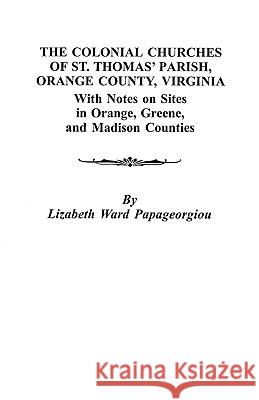The Colonial Churches of St. Thomas' Parish, Orange County, Virginia » książka
The Colonial Churches of St. Thomas' Parish, Orange County, Virginia
ISBN-13: 9780806353777 / Angielski / Miękka / 2009 / 136 str.
St. Thomas CO Parish in Virginia was formed from St. Mark COs Parish in 1740. The new parish encompassed present-day Orange, Greene, and a strip of southern Madison counties. Based on an extensive examination of primary sources, the work at hand is the first accurate description of the formation of St. Thomas CO Parish, its member churches, its ministers, and others who played a significant part in its colonial history. In the absence of surviving vestry books for St. Thomas CO Parish, or even an accurate map of the parish, the author was able to extract valuable information pertaining to St. Thomas CO Parish from the surviving vestry books of the neighboring parishes of St. Mark COs and St. George COs.
However, as Mrs. Papageorgiou explains in her Preface, Spotsylvania and Orange County road orders comprise the backbone of her study. The road orders for the construction and maintenance of roads, as recorded in county court order books, provide evidence to the existence of churches and chapels throughout the parish. The road orders CO value to the genealogist is that they identify the overseers and work crews assigned to maintain the road and any bridges along it. So, for example, the road orders tell us that, between November 1, 1726, and April 2, 1734, John Rucker, Thomas Jackson, Joseph Hawkins, Abraham Bledsoe, Henry Downes, John Davis, and George Eastham all served as overseers of roads near Southwest Mountain Chapel in St. Thomas CO Parish.
This work is an excellent example of historical reconstruction. The Introduction explains how, when, and why St. Thomas CO was established from its parent and grandparent parishes, St. Mark COs and St. George COs. Next, the author uses the road orders and other sources to pinpoint the timing and location of each of the following places of worship: Germana Church, Southwest Mountain Chapel, Southwest Mountain Church, Upper Chapel, St. Thomas CO Parish, Upper Church, Middle (Brick) Church, Pine Stake Church, and New (Orange) Church. (Mrs. Papageorgiou has also appended a number of important court orders at the back of the volume.) The third chapter gives the tenure of every parish minister and his family members. The final chapter recounts how previous writers--notably Bishop William Meade and Philip Slaughter--have recorded the history of St. Thomas CO Parish and where, more often than not, they went astray. Students of Virginia church history will welcome the comprehensive bibliography that follows the appendices."
St. Thomas?ÇÖ Parish in Virginia was formed from St. Mark?ÇÖs Parish in 1740. The new parish encompassed present-day Orange, Greene, and a strip of southern Madison counties. Based on an extensive examination of primary sources, the work at hand is the first accurate description of the formation of St. Thomas?ÇÖ Parish, its member churches, its ministers, and others who played a significant part in its colonial history. In the absence of surviving vestry books for St. Thomas?ÇÖ Parish, or even an accurate map of the parish, the author was able to extract valuable information pertaining to St. Thomas?ÇÖ Parish from the surviving vestry books of the neighboring parishes of St. Mark?ÇÖs and St. George?ÇÖs.
However, as Mrs. Papageorgiou explains in her Preface, Spotsylvania and Orange County road orders comprise the backbone of her study. The road orders for the construction and maintenance of roads, as recorded in county court order books, provide evidence to the existence of churches and chapels throughout the parish. The road orders?ÇÖ value to the genealogist is that they identify the overseers and work crews assigned to maintain the road and any bridges along it. So, for example, the road orders tell us that, between November 1, 1726, and April 2, 1734, John Rucker, Thomas Jackson, Joseph Hawkins, Abraham Bledsoe, Henry Downes, John Davis, and George Eastham all served as overseers of roads near Southwest Mountain Chapel in St. Thomas?ÇÖ Parish.
This work is an excellent example of historical reconstruction. The Introduction explains how, when, and why St. Thomas?ÇÖ was established from its parent and grandparent parishes, St. Mark?ÇÖs and St. George?ÇÖs. Next, the author uses the road orders and other sources to pinpoint the timing and location of each of the following places of worship: Germana Church, Southwest Mountain Chapel, Southwest Mountain Church, Upper Chapel, St. Thomas?ÇÖ Parish, Upper Church, Middle (Brick) Church, Pine Stake Church, and New (Orange) Church. (Mrs. Papageorgiou has also appended a number of important court orders at the back of the volume.) The third chapter gives the tenure of every parish minister and his family members. The final chapter recounts how previous writers--notably Bishop William Meade and Philip Slaughter--have recorded the history of St. Thomas?ÇÖ Parish and where, more often than not, they went astray. Students of Virginia church history will welcome the comprehensive bibliography that follows the appendices.











